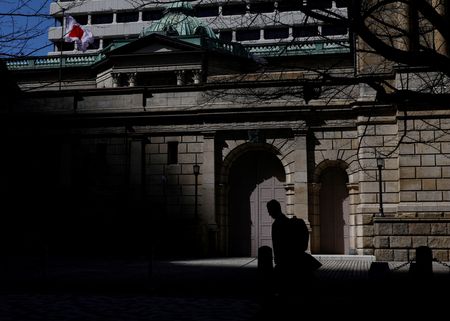By Ariba Shahid
KARACHI (Reuters) -Pakistan’s central bank cut its key policy rate by 200 basis points to 13% on Monday, it said in a statement, its fifth straight reduction since June as the country keeps up efforts to revive a sluggish economy with inflation easing.
Pakistan’s latest move makes this year’s cuts one of the most aggressive among emerging market central banks in the current easing cycle.
Cumulatively, the central bank has cut rates by 900 basis points during 2024, even higher than during the pandemic in 2020 when it cut 625 basis points in a year.
“Overall, the Committee assessed that its approach of measured policy rate cuts is keeping inflationary and external account pressures in check, while supporting economic growth on a sustainable basis,” the bank’s monetary policy committee said in a statement announcing its decision.
The bank noted that it expected inflation to average “substantially below” its earlier forecast range of 11.5% to 13.5% in 2025.
It added that the inflation outlook was susceptible to risks, including measures to meet government revenue shortfalls as well as food inflation and increased global commodity prices.
“Inflation may remain volatile in the near term before stabilizing in the target range,” the bank said.
During a call with analysts, the central bank chief, Jameel Ahmad, said that the State Bank of Pakistan (SBP) did not target any particular real interest rate level when making its policy rate decision on Monday.
However, he said in the past the central bank had targeted 5-7% inflation in the medium term, and this target was now in sight within the next 12 months.
The South Asian country is navigating a challenging economic recovery path and has been buttressed by a $7 billion facility from the International Monetary Fund (IMF) in September.
The bank noted that “considerable efforts and additional measures” would be required for Pakistan to meet its annual revenue target, a key focus of the IMF agreement.
All 12 analysts surveyed by Reuters had expected a 200 bps cut, after inflation fell sharply, slowing to 4.9% in November, largely due to a high base a year earlier, coming in below the government’s forecast and significantly lower than a multi-decade high of around 40% in May last year.
“The cut supports economic growth, evident from improved industrial activity and credit expansion. However, sticky core inflation and revenue shortfalls remain key risks to watch,” said Tahir Abbas, head of equities and research at Arif Habib Limited.
Monday’s move follows cuts of 150 bps in June, 100 in July, 200 in September, and a record cut of 250 bps in November, that have taken the rate down from an all-time high of 22%, set in June 2023 and left unchanged for a year.
(Reporting by Ariba Shahid in Karachi, Asif Shahzad and Charlotte Greenfield in Islamabad and Tanvi Mehta and Sakshi Dayal in New Delhi; Editing by YP Rajesh and Ros Russell)










